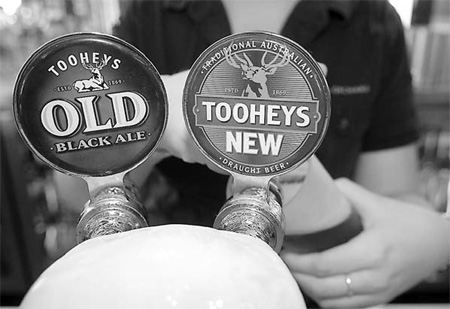-

A bartender pours a glass of Tooheys New beer, a Lion Nathan product, in a bar in Sydney. Kirin Holdings spent $4.6 billion to take full control of Sydney-based Lion Nathan. Bloomberg News
TOKYO: The yen's surge to a 14-year high may encourage Japanese manufacturers including auto-parts makers and pharmaceutical companies to accelerate acquisitions overseas, said bankers and analysts.
Gains in the currency are also likely to increase mergers at home as Japanese exporters seek to cut costs to offset the rising price of their goods abroad, said Koji Hirai, chief executive officer of M&A advisory Kachitas Corp.
Japanese companies have already taken advantage of the yen's 30 percent gain against the dollar during the past two years to make more than 800 acquisitions overseas worth $90.8 billion, according to Bloomberg data. Accumulated profits of Japanese companies totaled $3.2 trillion at March 31, up 4 percent from a year earlier, according to a Ministry of Finance survey of 2.8 million firms.
"M&A will happen - there is a need to switch to a more profitable business model taking advantage of the strong yen," said Takeshi Miyao, a Tokyo-based supply-chain analyst for auto consultant Carnorama. "There is a very real possibility for acquisitions of European or US companies that are in a weak position because of the financial crisis."
The MSCI World Index of 1,657 companies has slumped 29 percent in the past two years, helping cash-rich buyers in search of bargains. Kirin Holdings Co led purchases of overseas assets by Japanese companies in 2009 after spending $4.6 billion to take full control of Sydney-based Lion Nathan Ltd and acquire almost half of San Miguel Brewery Inc in the Philippines.
Takeda, Akebono
Hirai, who said he is currently advising a Japanese auto-parts maker on an eastern European acquisition, cited pharmaceutical firms and car-parts firms as likely to make takeovers overseas. He declined to identify his client or specify individual companies.
Osaka-based Takeda Pharmaceutical Co may consider acquisitions in South America and is interested in expanding in generic drugs, President Yasuchika Hasegawa said. Takeda's $8.9 billion cash purchase of Cambridge, Massachusetts-based Millennium Pharmaceuticals Inc topped a record 441 overseas transactions by Japanese companies in 2008, according to Bloomberg data.
Akebono Brake Industry Co, an affiliate of Toyota Motor Corp, expects to close its planned purchase of Robert Bosch GmbH's North American brake business by the end of this year.
"Japanese companies may also ride the strong yen to advance in Asia," said Hirai, who says he has advised on 64 deals since 1991. "And it doesn't just have to be acquisitions, they can hedge their risks through share purchases and joint ventures."
The yen yesterday fell the most a month against the dollar after the Bank of Japan bank held an emergency policy meeting, spurring speculation it will seek to curb exchange-rate appreciation. The currency dropped 0.7 percent to 87.04 per dollar as of 3:40 pm in Tokyo, heading for its biggest slide since Oct 29, after the Bank of Japan set up a new lending facility to support banks and the economy.
The US dollar averaged 103.37 yen during 2008 and this year dropped to an average 93.95 yen. The odds of the yen strengthening past 84.83 per dollar, the highest since July 1995, to 84.5 by the end of March rose to 80 percent, options data compiled by Bloomberg show.
Exporter threat
The yen's overall rise threatens profits at exporters from Sony Corp to Toyota in a nation that depends on exports for about 12 percent of its economy, compared with 6 percent in the US. Lower earnings coupled with rising pension costs may mean companies won't use their cash for mergers and acquisitions, said Yuuki Sakurai, chief executive officer of Fukoku Capital Management.
"After Lehman collapsed, Japanese companies made sure to keep a lot of cash on hand for liquidity purposes," said Sakurai, whose Tokyo-based firm manages the equivalent of about $9.3 billion. "Whether they will actually spend that cash is a different question."
The auto components industry needs to consolidate, Yann Delabriere, chief executive officer of French car-parts maker Faurecia SA, said in Tokyo on Nov 25. The Japanese parts industry "is very strong and has the ability to internally manage consolidation," he said.
Carmakers including Toyota and Honda Motor Co are shifting or are considering moving production of some models to the US in response to the stronger yen, and the parts-makers will have to follow them,said Ashvin Chotai, managing director of Intelligence Automotive Asia.
"They will either have to expand their own operations or make an acquisition," Chotai said of the parts makers. He said investors should expect more consolidation and distressed assets in the parts sector.
"The yen's appreciation will be a driving force in Japanese companies making takeovers overseas," said Taiji Okusu, a managing director of investment banking at Credit Suisse Group AG in Tokyo.
Bloomberg News
(China Daily 12/02/2009 page17)
